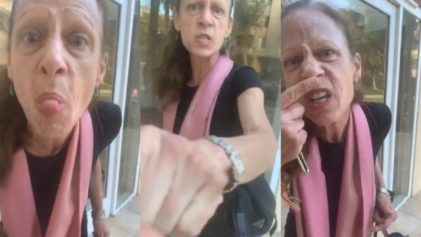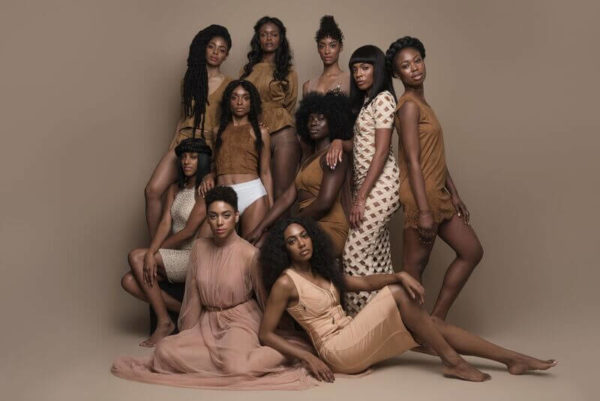
Elizabeth and Jones planned the campaign in January before reaching out to 10 women through Instagram in April. The photo shoot was complete in May, featuring women with not only varying skin tones but different backgrounds, too.
“One girl’s a single mom; one girl is really into health and fitness, travel that kind of thing,” Jones told Atlanta Black Star. “So it wasn’t really just different skin tones and different hair types and different body types, it was differences and variances across the board as far as lifestyle – whatever goes into her everyday life and career as well.”
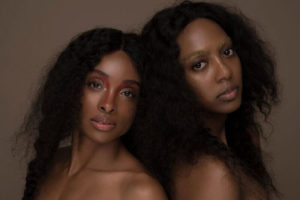
Victory Jones and Tori Elizabeth (Joey Rosado/@thecgirlinc)
“We wanted to find features that a lot of times the media tends to not celebrate,” Elizabeth said to ABS. “Whether it be a nose or a jawline, you know, just different features that we naturally have as Black people that a lot of times becomes culturally appropriated.”
Those features were highlighted in the photos using different colors of the rainbow to paint or outline the models bodies. Blue lipstick spread across Leineal Howard’s full lips, while white color zeroed in on Malyia McNaughton’s wide nose.
Jones said they focused on “the most outstanding feature that women had, which also happened to be something that might not be as celebrated when a Black woman has it.”
“Oddly enough the feature that we chose actually ended up being the feature that most of them were insecure about when they grew up,” Elizabeth added. “But it was interesting how that tied in because – like Lei with her lips – it took her a while to even accept them. So I just thought that was interesting. The thing we were like ‘Oh my God that’s so unique’ was an insecurity at one point.”
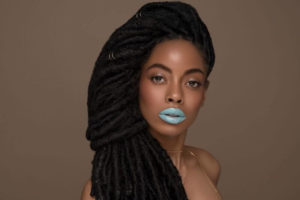
Leineal Howard (Joey Rosado/@thecgirlinc)
The campaign made its debut June 21, with women explaining why they are proud of their Blackness, which ranged in hues from dark to light. Highlighting the varying shades of Black was important to express in the campaign.
“There’s almost 14 different hues or shades of Black, so I think for us to only represent one would be almost discrediting Blackness,” Elizabeth shared. “So we wanted each person to be included.”
“It was a matter of showing different shades, having the unity in it,” she continued.
While the duo launched the campaign to celebrate all varieties of Blackness, they did not always have confidence in their own. It was their experiences with colorism and racism that helped influence the project. The real-life best friends – who met on Instagram 3 years ago – had their share of each growing up.
Elizabeth attended Texas A&M University when President Barack Obama was elected to his first term, and the wardrobe stylist was forced to come face to face with racism.
“I watched – literally, I had white friends who stopped talking to me once he won. The day he won all the Black students, we couldn’t go to class,” she said to ABS. “We had to actually go into a building and stay in this room because if you look[ed] out the window you saw the white students and their parents protesting with signs.”
Elizabeth, who served as co-creative director and stylist for the TCG shoot, also dealt with colorism in her own community with a Cuban and Jamaican family.
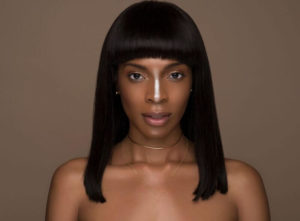
Malyia McNaughton (Joey Rosado/@thecgirlinc)
“My father, he’s West Indian. So within the West Indian community, it’s a lot of light skin versus darker skin. And so my father always would date lighter skinned women with good hair because he wanted his children to be the same, but oddly enough his children came out darker skinned.”
She and her brother are both darker skinned, so Elizabeth said she has faced different treatment compared to lighter skinned relatives. She added that she has dealt with colorism on her mother’s Texan side of the family.
Jones, who was the TCG shoot’s co-creative director, had similar experiences with family. She said they would make jokes about others needing a relaxer or sitting in the sun too long. The self-described hippie has dealt with colorism in the Indian and Jamaican communities – both of which are part of her heritage.
“They’re pretty much just the same or worse than Black people when it comes to colorism amongst themselves and how lighter is better, darker is not,” Jones said.
Furthermore, she faced racism in her work as a recording artist.
“I’ve experienced white or lighter skinned artists be put ahead of some of the darker skinned artists and promoted differently or promoted better because the aesthetic is more set to the European standard, even though their work might be equal or not as good as somebody else with dark skin. I’ve seen that first hand.”
But Jones believes social media has opened up acceptance of dark skin tones, debunking the idea that Black skin is unloved.
“Mainstream media was more divisive and social media has kind of opened it up to where anybody can create content. So if you are a dark skinned girl and you’re posting selfies, now there’s more images of dark-skinned girls or dark-skinned guys posting images of themselves. And so you see more of that and it becomes more normalized.”
Feedback for TCG’s campaign has been generally positive outside of a few naysayers who complained about a lack of representation of varying body types, sizes, ages and heights. But all of those aspects were actually depicted in the shoot.
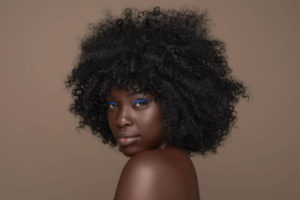
Christina Abiola (Joey Rosado/@thecgirlinc)
“Also – the name The ‘Colored’ Girl – a lot of people felt like colored was derogatory,” Elizabeth said. “We wanted to take [colored] back and make it beautiful.”
“Nobody can remove you from your seat of power,” Jones added. “You can own that and own who you are and love yourself. And that’s also another reason why we decided to put different colors on the girls as a play on words because it was The ‘Colored’ Girl.”
Without going into details, TCG is planning four series and is looking at creating a docu-series. Many things are in the works once the campaign reaches more people, including panel discussions, meet-and-greets and open forums online. The founders also hope to make TCG a global campaign to spread awareness of self-love in the Black community and beyond.
“I would love for them to see the beauty and the power in it,” Jones said of her hopes for the movement. “And how we can come together and create beautiful things and unify and work together and also celebrate our culture, but that doesn’t mean we have to be exclusive of other cultures.”
Elizabeth also wishes for a sense of unity to evolve from the campaign.
“I want people to know it’s OK to love being Black, but that does not mean it’s Black versus anyone else,” she said. I don’t want people to think, like, ‘Because I’m Black I’m better than you.’ It should be ‘I’m Black and I’m enough. Period.’ “

